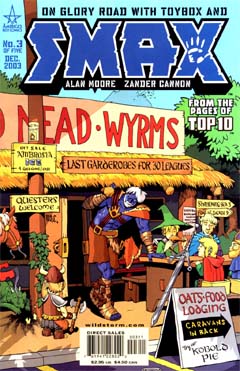
Notes on Smax #3
by Foo Sek Han and various people.
Corrections, additions, and suggestions are welcome - please either
leave
a comment (livejournal account not required) or send me an
email.
(Except when otherwise credited, all text © copyright 2003 Foo Sek Han. Please
ask for permission if you want to duplicate.)
All characters and art are copyright 2001, 2002, & 2003 their respective
creators.
Publications, titles of publications and characters appearing therein are ©, ®
and/or ™ of their respective publishers, authors or creators.
History:
November 08 2003
November 05 2003
November 01 2003
Cover
The exterior of an inn is possibly one of the most clichéd elements of High
Fantasy fiction, with its great grand predecessor set as The Prancing Pony
from Tolkien's Lord of the Rings. However this looks to be more like a modern
rest stop rather than a typical inn, what with the "Last Garderobes for 30
Leagues" sign on the roof, and the existence of a W.C., which Smax is shown
walking out from.
The large sign is "(something) O - Mead - Wyrms". Mead is considered one of
the basic food groups alongside protein, carbohydrates and so on in a Dungeons
and Dragons setting.
While it is not apparent at first, the little group of people eating at the
table near Smax is part of his party, with Robyn in a green wizard hat (note
her toybox) sitting beside Aldric and facing a couple of dwarves.
Is that supposed to be a telephone pole? The little "Missing Children" sign
has Little Red Riding Hood. Ambrosia is a mixture of nectar and pollen
prepared by worker bees and fed to larvae, used to be considered as a food
fitting for Gods.
There's a poster behind Robyn and Alric promising "Earn Big Doubloons Working
From Your Cottage". This is the medieval equivalent of the current spam mail
of "Work at home and earn big bucks" which, unfortunately, is still conning a
good number of people of their honest money. Doubloons are a currency in JK
Rowling's Harry Potter series. Also note that the lower part seems to have
tear-off phone numbers (phone numbers?) but nobody seems to have been duped.
Yet.
I have no idea where "Shrieking Sea" and "Fog of Death" comes from, other than
them being pretty much typical names for locations in high fantasy settings.
The sign on the road makes it apparent that this is an inn. The kobold (A kind
of domestic spirit in German mythology, corresponding to the Scottish brownie
and the English Robin Goodfellow) is one of the few mythical creatures
bastardized by Dungeons & Dragons to become basic hack-and-slash fodder, hence
the ease in obtaining a pie made of Kobold flesh.
And check out the modern tar road at the lower edge of the cover, complete
with parking lot yellow paint!
KOBE 27 says: "On the Cover, you mention Doubloons are a
currency in the Harry Potter books. I'm sure you already know
this, but Doubloons were also the currency in 14th Century-18th Century Spain.
They're FAMOUS as pirates' treasure for that reason. On almost every pirate
movie (or novel) you can mention there was a treasure chest packed full with
Spanish gold Doubloons." Opps, I forgot this fact...
Page 1
Eroom Nala notes that the script for the first two pages can be found here:
http://www.alanmooresenhordocaos.hpg.ig.com.br/script3.htm
Flying objects, from left: A dragon's tail, silhouette of an owl/bat, Hedwig
(Harry Potter's owl) carrying a scroll, A stork with a baby, a crow in necktie
and hat, a winged donkey, a winged monkey (from Wizard of Oz), an orange
(butterfly?), two unidentified black blobs, a griffin (possibly the Gryphon,
one of the gatekeepers of Dream's domain in Neil Gaiman's Sandman), and a pair
of hands (the way to create a shadow of a pair of wings on the walls). There
seems to be a number of bats flying in daylight.
Chris Murphy says: "The magpie with the fedora and necktie
is either Heckyl or Jeckyl, the chatty, well dressed magpies of cartoon fame."
Heckyl and Jecyl are from Terrytoons, the same company which produced the more
famous Mighty Mouse.
Diello notes: "Next to the Griffin (the little ball with the fluttering wings)
could also be from Harry Potter, the flit from the Quidditch game." That would
be The Golden Snitch, which flies around in a hyperactive daze around the
field during a play of Quidditch. Harry Potter is, in fact, the Seeker, who is
the player in a team in charge of grabbing the Snitch.
Diello continues: "The pair of hands is similar to the "rabbit ears" from
isssue 2, it was a hand holding up two fingers."
Note the cartoon sunrays coming out from the sun.
I can't place the three persons in the lower end of the page, but the leftmost
is dressed up in Robin Hood gear. He doesn't look like Kevin Costner, though.
The koala looks like a famous 80's cartoon character which I can't place.
There's a little house in the tree with the M of SMAX. I think it's one of the
huts of LoTR's Lothlorien.
From the script, Pegasus, The Flying Nun, Faeries, and That Stupid Looking
Thing From Neverending Story do not appear among the flying creatures. Since
Mr. Moore noted them in the script, I think they deserve some annoatation.
The Flying Nun is a fantasy sitcom shown 1967-1970. More info here:
http://www.tvtome.com/tvtome/servlet/ShowMainServlet/showid-1125/
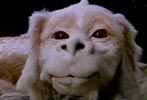 Neverending Story is a 1984 children's
fantasy movie, which spawned two far-from-decent sequels. The Stupid Looking
Thing From Neverending Story is referring to Falkor the dragon, which looks
something like a talking shaggy flying carpet.
Neverending Story is a 1984 children's
fantasy movie, which spawned two far-from-decent sequels. The Stupid Looking
Thing From Neverending Story is referring to Falkor the dragon, which looks
something like a talking shaggy flying carpet.
KOBE 27 notes: "you mention The NeverEnding Story as an
1984 children's fantasy movie. I'm sure this was a simple oversight, but you
failed to mention the novel by Michael Ende on which it was based on, which is
actually MORE famous than the movie (a rare feat these days), save for America
as usual. The other two movies also borrow from the book, but very slightly."
The title is from Syd Barrett's song "Octopus", like the previous episodes of
Smax. The original part of the lyrics is "Grasshopper's Green Herbarian Band",
altered to be "Grasshopper's Green Burying-Band".
Page 2
This might be just imaginary, but is the Lion of the wardrobe responding to
Smax's dialogue through facial expressions? On Panel 3, when Smax says, "Now
that's over, we can hop the first magic spell home", the lion looks slightly
upset. It looks disapprovingly at Smax on Panel 7 after he says "So no quest,
okay?", then almost shares Robyn's possible expression in the following panel.
This might be true, since in one of the Narnia books (The Voyage of the Dawn
Treader), Aslan the lion's face appears on the book Lucy is reading when Lucy
seems to, metaphorically, lose faith. The fact that Smax is losing faith in
adventuring and quests, shown in this page, seems to assert this assumption.
Alan Moore's script never mentions anything about the Lion. Guess I might be
over-speculating.
Diello points out: "The lion on the wardrobe automatically
makes me think of the Lion, the Witch, and the Wardrobe. I guess here, Robyn
is the witch." I didn't think of including this because it was noted in the #1
annotation, hence Robyn's being the witch escaped my mind. Nice one!
Robyn is wearing a shirt with the slogan "Never Mind the Balrogs". The Balrog
is a centuries-old flame demon in Lord of the Rings, featured in the first
book in a battle with Gandalf the wizard. This reference is from the Sex
Pistols 1977 album "Never Mind the Bollocks, Here's the Sex Pistols".
KOBE27 notes: "On Page 2, you mention the Balrogs and LotR.
Despite the appearance of one in the first book of LotR,
technically, the Balrogs belong to the First Age so they should be mentioned
alongside Tolkien's Sillmarillion."
I'm not sure why there is a white mouse on the wardrobe. The closest I can
think of is the little white mouse (or, a bunch of pixels) in the first Prince
of Persia computer game, which helps the prince (you) and princess (object of
desire) to communicate.
Page 3
Panel 1: I don't know what the hanged stork means, unless someone
decided to kidnap the baby in Page 1 and kill the messenger.
Regarding the hanging stork:
Diello: The hanged stork may be a refernce to a famous urban legend from the
film version of the Wizard of Oz. Alledgedly, in one of the scenes (either
when Dorothy meets the Scarecrow, or when they meet the Lion, can't remember
which), you can see one of a little person hang himself from a tree, in
silhoutte. The rumor was he was a depressed actor and decided to end it all on
screen. Obviously this was far from the truth. The truth being that it was one
of the large birds used in the film that got away from its handler and jumped
down off a branch. The truth blends with fiction here.
Chris Murphy: In the film version of "The Wizard of Oz", in one of the many
scenes where Dorothy and company are waltzing down the yellow brick road,
there can be seen, in the far background, a shadowed stork, bending at the
waist. An urban legend has it that it is not a stork at all, but rather a
depressed set designer/technical staff person who is committing suicide by
hanging himself. My guess is that the hanging stork is a conglomeration of the
two stories.
Being that I haven't seen the movie myself (before my time... well) the most
accurate reference I found referring to this urban legend is, unsurprisingly,
Snopes.com.
Apparently the legend is that one depressed Munchkin - those cute little folks
rejoicing when the bed slams into the Wicked Witch of the East - actor
commited suicide and was caught in film. This was in truth, as mentioned by
both Diello and Chris Murphy, a crane which just happened to be having a nice
and very undepressed stroll.
Winnie the Pooh is stuck to a rabbit hole. This is the most famous stories
written by AA Milne, Pooh Goes
Visiting, where Pooh decides to visit Rabbit, and ate so much honey he got
stuck in the front door. However, the original story had Pooh's head stuck
outside, not the other way round.
KJW says: "Since Pooh is stuck the other way round, his
chance of survival will be... well, I think those insects are flies, not
bees... and that Winnie has departed to the great honey pot in the sky." Ouch.
Totoro is seen on the right edge, with an umbrella. Totoro is from My Neigbour
Totoro, an anime movie done by Hayao Miyazaki, which features a huge feline
forest god. Its name comes from the mispronunciation of one of the movie's
main characters, who was trying to call it a "troll", based on the troll under
the bridge in the Three Billy Goat Gruffs. His first appearance in the movie
(excluding smaller Totoros) is at a bus stand with an umbrella.
Diello notes the bottom of the tree by Pooh - it appears as
if someone's been evicted.
Panel 3: Robyn's shirt "DIY" seems to be saying something about "If you
can't convince him, you might as well do it yourself."
Page 4
 Panel 1: I have
seriously no idea what the lion-hawk-woman-headed being, with the eye as a
stomach, with the flaming sword, with the heart in the hand, with the snake
body, and with the are-those-zodiac? signs floating around her is. Unless, of
course, it is a play on various elements:
Panel 1: I have
seriously no idea what the lion-hawk-woman-headed being, with the eye as a
stomach, with the flaming sword, with the heart in the hand, with the snake
body, and with the are-those-zodiac? signs floating around her is. Unless, of
course, it is a play on various elements:
- Three heads: The chimera has three heads - a goat, a lion, and a dragon
- Eye as stomach: The saying "His eyes are bigger than his stomach"
- Flaming sword: Angels are said to have flaming swords. I think Gabriel
is supposed to have one.
- Heart in hand: The heart appears to be either emitting steam, or is just
freshly cooked. Also note the thorns. I have no idea what this is.
- Golden signs: I just know they are golden, and some look like zodiac
symbols
- Snake body: Closest I can think of is the Chinese legend of Nu Wa, who has the lower body of a snake. She is said to have created man out of clay.
There's a floating pyramid with an eye just below the steaming heart, which
looks like an Illuminati symbol. The Illuminati is a society rumoured to be
behind a number of conspiracies, and knows a good number of secrets including
the fate of Atlantis.
The apparition on the left looks like the Phantom Stranger of DC comics. The
Phantom Stranger is a mysterious person who appears and aids people in quests,
often dressed up similarly to what is shown here.
Eroom Nala of the DC Boards says:
"The apparition on page 4 made me think of "The Lure" in "Greyshirt: Indigo
Sunset", this monster has a magic tail, too. The allegorical figure (lady with
sword and three heads) looks like a gnostic"
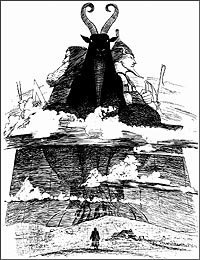 J. Kevin Carrier says:
"I don't have my copy of FROM HELL handy to check, but I believe that 3-headed
deity is the same one that William Gull sees during his seizure. The
silhouetted figure with the top hat and butcher knife is Gull himself."
J. Kevin Carrier says:
"I don't have my copy of FROM HELL handy to check, but I believe that 3-headed
deity is the same one that William Gull sees during his seizure. The
silhouetted figure with the top hat and butcher knife is Gull himself."
From Hell, written by Alan Moore and Eddie Campbell, is one of Mr. Moore's
most famous post-Watchman pieces. A story detailing on the Jack The Ripper
murders during Victorian England, Mr. Moore takes a different approach on the
story by focusing on Sir William Gull's - both court physician and the Ripper
himself - religious fanatism and the concept of magic and beliefs. It has been
adapated into a film starring Johnny Depp and Heather Graham, receiving mixed
reviews.
The three-headed diety Mr. Carrier refers to is Jah-Bul-On, the Freemansory
deity. It joins Jehovah (Jah) with two pagan gods, the pagan Canaanite deity
Baal (Bul) and the Egyptian god Osiris (On). I'm not sure what Jah-Bul-On
really looks like, but the illustration done by Eddie Campbell is quite
different. However, Jah-Bul-On could have many different appearances, as do
many other Gods.
If the silhouette is indeed Gull (in Ripper gear), this could be referring to
the events in Chapter 14: Gull, Ascending in the From Hell graphic novel. This
is quite near to the end of From Hell, so I won't reveal what happens there.
The snake at the background seems to have a wig.
Eroom
Nala points out that this is Glycon, the ancient snake god Alan Moore
currently worships. For those not in the know, an excerpt from the
Onion AV Club interview:
With magic, I worship a second-century Roman snake god who, on the best
evidence that I can dredge up from that period, was some kind of elaborate
glove-puppet that was being controlled by a second-century snake-oil salesman,
basically a complete fraud, huckster, and showman. I don't want anybody else
to start worshipping this god. I find something a bit unnatural in the idea of
being bound together in spiritual ideas with people. I'm sure that, in our
natural state, we all believe something entirely different. I don't
necessarily want anybody to believe the same things I believe, which is one of
the reasons why I've adopted such a patently mad sort of deity. The idea of
the deity is all I'm interested in, so that's fine for my purposes.
More info on Glycon, given by Eroom Nala, can be found here:
http://www.ispt.ro/mm/glycon.html
http://www.vroma.org/images/mcmanus_images/index6.html
Diello notes: "the snake with the blonde hair for some
reason, vaguely reminds me of the girl Muppet (Janice?) from Dr. Teeth's
band."
The little Chinese words hopping around the ground is "Chong", which means
"insect" or "worm". It's obvious why there are so many of them here, of
course. Trivial fact: While "Big Worm" in English sometimes is synonymous to
Dragon, in Chinese "Da Chong" / Big Worm means Tiger, at least in ancient
literature.
Panel 3: Rains of frogs is often used as a bad omen. This phenomenon is
usually caused by a whirlwind striking a pond full of frogs, thus throwing the
frogs in the air before dropping them on some unsuspecting village. Other
occurrences include rains of fish and so on. Unlike the usual case, these
frogs seem to be mostly alive.
Eroom Nala notes that rains of frogs appeared also in the 1999 movie
Magnolia.
Diello points out what most of us would have missed!
"That's Kermit falling at the bottom left (or it could be his nephew Robin),
note the pattern around the neck."
Page 5
Panel 1: The popular legend of a male animal giving birth to a baby
probably started with the legend of a cock laying an egg. While calves with
two heads are normal, triple-headed calves are somewhat a different matter
altogether.
I don't know what the old man with a golden ear is, but the winged serpent may
be Quetzacoatl, the Aztec deity.
Finding the name of God / the image of Christ / the image of Mary in mundane
places, while all too commonplace, often gets lots of spectators flocking the
area. The latest I have heard is the fence broken in such a way that when a
shadow is cast, it shows the image of Mary. Unsurprisingly, worshippers gather
there at the designated time the shadow would appear everyday.
Panel 5-7: The perspective of these panels is gradually changing, going
on a panning angled shot to the left. Hence Smax and Robyn appearing larger,
and explains the mystery of the disappearing chocolate mat.
Page 6
Panel 1: Notice Smax's footprints (they don't sink into the ground
when he's calm), the broken door and the poor tree that dared to be at its
path.
Panel 4: The clouds seem to be sprouting legs. I don't know what
reference this is? Eroom Nala says these are from Monty Python and the Holy
Grail.
There's a little "Vote" poster lying on the ground.
Diello points out: "Page 6, Panel 1-3 - Along with Smax's
footprints, note the front door has been knocked off its hinges.
Panel 4 - The Clouds and Sun with legs are indeed from Monty Python and the
Holy Grail, specifically from one of the many Terry Gilliam-animated
segments."
Page 7
Panel 1: I'm not sure why there is a little starburst at the tip of
the mountain in the background.
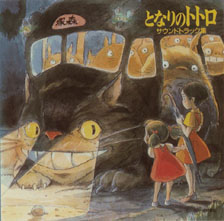 Panel 2: Now, we wouldn't want
public transport to prey on each other, would we? The pumpkin carriage pulled
by mice is the one directly from Cinderella, while the "No" sign is the
Nekobus / "Cat Bus", which comes from Miyazaki's "My Neighbour Totoro".
Instead of wheels, the Nekobus has caterpillar-like legs, with its eyes
headlamps, and the interior completely flesh and fur.
Panel 2: Now, we wouldn't want
public transport to prey on each other, would we? The pumpkin carriage pulled
by mice is the one directly from Cinderella, while the "No" sign is the
Nekobus / "Cat Bus", which comes from Miyazaki's "My Neighbour Totoro".
Instead of wheels, the Nekobus has caterpillar-like legs, with its eyes
headlamps, and the interior completely flesh and fur.
J. Kevin Carrier says: "The pumpkin-carriage pulled by mice
is from Cinderella (the Disney version at least, I don't recall if they're in
the original story)."
In the original Grimm story (which includes the sisters chopping off their
heels to fit their feet into the silk - not glass - slipper), Cinderella ran
to the ball by herself. I'm not sure whether the Walt Disney Company, or the
persons who made fairy tales kid-friendlier, were responsible for adding the
mice and the carriage. The original translated version can be found here:
http://www.ucs.mun.ca/~wbarker/fairies/grimm/021.html with more gory tales
on its
main page.
There's a "East Side Orcs Rules" graffiti on the bench. I think it has a
better reference, but it could be related to the gangs in "West Side Story".
Orcs are a race of warmongering brutish people, used as the servants of both
Sauron and Saruman in the Lord of the Ring trilogy. This race is also often
used in Dungeons and Dragons as the primary nasty race you can beat up without
your conscience berating you.
Panel 3: A frog is working on the carriage.
Panel 4: I'm not sure what these two characters are.
According to Eroom Nala:
"the 2 characters from the recently (about 20 years or so ago now extra
chapter to Alice in Wonderland called the Wasp in the Wig)" Continued: "The
Wasp in the Wig was published by PanMacMillan in 1977 and is also included in
the Annotated Alice (Updated Edition 1999) by Martin Gardner."
Wasp in the Wig can be found here:
http://www.student.kun.nl/l.derooy/alice4.html and also some illustrations
here:
http://www.english-usage.com/WaspInAWig.htm
According to MacKenzie: "The mouse in the carriage is
likely Vladek Spiegelman, father of Art Spiegelman in his acclaimed work Maus.
The book details the artist's relationship with his father and his father's
experiences during the Holocaust; Art also portrays the Jews as mice and the
Nazis as cats. In the scenes where Art interviews his father to create the
book, Vladek wears glasses very similar to those on the mouse in the panel."
Panel 5: Grasshopper Green is from the book
Grasshopper Green and the Meadow Mice by John Rae.
"Welcome Careful Dark Riders" seems to be pointing to the Nazhgul, which are
known as Dark Riders in the Lord of the Ring trilogy. I'm not sure why
"careful" is needed though - unless it's pointing at
Easy Rider, the Dennis
Hopper-Peter Fonda movie on Harley Davidson riders.
Page 8
As if missing most of the references in Page 3 wasn't humbling enough, Page
8 really delivers the killing punch. ARGH!
Clockwise from top left:
The stegosaurus tail has some form of armour - I think it's from James
Gurney's Dinotepia series, where humans and dinosaurs live together.
I'm not sure what the houses in the tree branch are, and what significance the
golden towers have. One of the towers seemed to be pointed, while the other
resembles more like a mosque. zachd from DC forums note: "Rapunzel is waiting
for her love" There is a braid of hair hanging from one of the tower windows.
The Mock Turtle of Alice in Wonderland is held in stocks "For the Cryme of
Mockery".
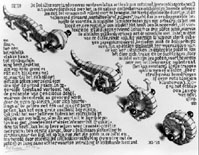 The caterpillar-like creature on the
steps is based on the MC Escher lithograph Curl Up 1951.
The caterpillar-like creature on the
steps is based on the MC Escher lithograph Curl Up 1951.
Trogdor the Buninator
is featured on the poster "And the Dragon Comes in the Night". This is a
Homestar Runner reference.
The signs are pointing to "Bull Market", "Bear Market" and "Goblin Market".
The Bull and Bear markets are jargon used for stock market trading, where Bull
means improving economy, and Bear contrasting it. The Goblin Market is...
well.
J.Kevin Carrier says that "Goblin
Market is a poem by Christina Rosetti about two sisters who stumble across
an enchanted marketplace."
The store is hanging signs of a steak, a loaf and a candle. I'm not sure what
this means, but the steak resembles an ear, which might point to multiplayer
games in Blizzard's Diablo (killing another player will earn you the medal of
said player's severed ear). There are "four+20 blackbirds pie" being sold for
"6p" , and Jack B.Quick's Memoriam Olympic entry forms. Jack B.Quick is a
character in Alan Moore's Tomorrow Stories compilations.
J. Kevin Carrier notes: "Lots of nursery rhyme references
here: The signs showing a steak, loaf, and candle are a reference to the rhyme
about Three Men in a Tub: "The butcher, the baker, the candlestick-maker".
Blackbird pie is from "Sing a song of sixpence, a pocket full of rye, 4 and 20
blackbirds baked in a pie". The "Jack B. Quick Memorial Olympics" probably
refers not to the Tomrrow Stories character, but his nursery-rhyme namesake:
"Jack be nimble, Jack be quick, Jack jump over the candlestick.""
KJW also says "Jack B.Quick is referring to the song by Don McLean, American
Pie. A part of the song goes something like Jack be nimble, Jack be quick."
According to
The
Annotated American Pie, this is a reference to Mick Jagger of the Rolling
Stones, on the 1968 release "Jumpin' Jack Flash".
Basilisks, Manticores and possibly Griffins are being sold as meat, as shown
on the posters of the shelf. Sickles is a currency used in the Harry Potter
series.
The child being chased by the dog is Nobby from celebrated British children's
book author Enid Blyton's Nobby series. Eroom Nala notes that both dog and
wagon are from the old Chuckwagon commercials.
Is that a fairy prostitute receiving money from a fishy john? I'm not sure
where these two characters come from. I'm not sure what "Whingding Dillymeat"
of the sign above the john means either.
Diello: "The sign reading "Wing Ding Dilly Meat" is a
reference to the childrens story Wind Ding Dilly by Bill Peet."
I'm not sure what the two little goblins playing dice on the street are from.
The dark cloaked figure seems to have some reference, seeing that the weapon
he is holding is a bit unusual - I just can't place him from anywhere.
Diello comes into the rescue again, pointing out: "The
"dark cloaked figure" isn't cloaked. It's one of the armored cockroach-type
soldiers (Hunters?) the Skeksis used in the Jim Henson film "The Dark
Crystal." And strangely enough, the thing he's holding is the Glaive from the
film "Krull." (last seen on the cover of issue 1). Don't know what the blue
thing on its head is."
Incidentally, Neil Gaiman and Dave McKean have finished production a few
months earlier of Mirrormask, a movie project which also involves Jim Henson's
daughter.
Note the little triangle sign on the back of the carriage!
Don't throw out the baby with the bathwater! Sherlock Holmes' silhouette is
above the Pied Piper's music school sign "Hamelin Music", which is located at
Knockturn Alley from Harry Potter. The chimneys probably have some
significance; there is a "DNKA" sign - playing on DKNY "Donna Karen New York".
I'm not sure what DNKA means.
Humpty Dumpty is prevented from falling down and breaking apart in the
cruelest way possible.
Page 9
Panel 1: The person in orange with the double swords is Sergio
Aragoné's Groo The Wanderer.
Who is that yellow giant?
Diello notes: "The "big yellow giant" looks kind of like
the big brute who would always antagonize Bugs Bunny in various medeival/fantasy
themed Warners shorts. Is that Robin and Friar Tuck next to Smax?"
There is also a knight in a red cape under the "Blank Signboard" beside
Goblin's Deli and the grey building. (I'm sure the buildings and the signboard
has some references) The "Blank Signboard" building has something looking
suspiciously like a makeshift satellite dish above its roof.
Panel 2: Smax talks about the Department of Quests, Trilogies and
Sagas. Trilogies are important fantasy novel-wise because of LoTR, and almost
every epic high fantasy novel wants to be a trilogy after that. Sagas are
novels which couldn't fit into just three books and expanded into too many,
the prime culprit being Robert Jordan and the never-ending Wheel of Time
series.
Not sure what the flask-like building is, and there is a Mexican hat on the
ground (Speedy Gonzales?). Considering the value most RPG games and campaigns
hold among amulets and gold eggs, the beggar seems to be asking for the
equivalent of a thousand dollars in the real world. His sign also says "Would
Marry For Food"
Panel 3: The Bean/Cow scandal points the old man as Jack of the
Beanstalk fame. Jack is credited as the lazy youth who always want the easy
way out, hence causing his family to have so little money as to having to sell
their sole cow.
The Miller VS Cobbler event Smax is describing in Panel 3-4 is suggesting that
Willy Wonka (the miller) has overtaken Santa Claus' (the toymaker) empire.
Panel 4: Smax is talking about one of Roald Dahl's most famous children
stories, "Willy Wonka and the Chocolate Factory". WW, an eccentric man,
created an empire of chocolate and candy factories. The description of toffee
rivers and Oompa-Lumpas are accurate.
I don't know who the black-haired child is. I don't seem to find any
significant reference to the Skullboy quote. The white spectral kid is Casper
the Friendly Ghost, a Harvey Comics' character.
Christopher Murphy points out: "The solemn looking chap
next to Casper is either an ABC version of DC-Vertigo's Death, or one of the
other Endless." Death is one of the siblings of the Endless, which comprises
of Destiny, Death, Dream, Destruction, Desire, Despair, and Delirium, who was
once Delight. This is from Neil Gaiman's Sandman series, and just recently
featured in Endless Nights, the Vertigo ten-year anniversary graphic novel.
The child looks a lot like Dream in both hairstyle and eyes, though wearing a
t-shirt with an ankh, which suggests Death. This could be referring, too, to
Jill Thompson's "The Little Endless Storybook", which featured the Endless
family in kiddy cute form.
Panel 5: Not sure where the hanging mask is from.
There seems to be a wrapped body in the sewer drain, which I can't place.
The Harvey Comics characters are Wendy the good little witch (the little girl
in red), Spooky the scoundrel ghost (the spectral child with the hat), and one
of the three brothers who menace Casper (the spectral child with the twist in
the head). The little skeleton does not seem to be from Harvey Comics,
however, and I don't know where it is from.
The wanted poster is possibly Jhonen Vasquez's Johnny the Homicidal Maniac.
The boy on the right is pretty obvious Harry Potter, complete with lightning
scar, round glasses, and the H sweater given to him by Mrs Weasley. The
tombstone "The Boy Who Died" is a play on the first chapter of the first book
Harry Potter and the Philosopher's / Sorceror's Stone, which is entitled "The
Boy Who Lived".
Page 10
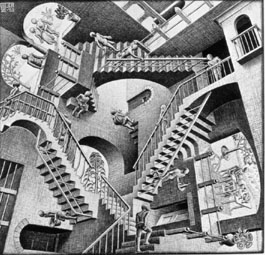 Panel 1: The background is
based on Relativity 1953, a lithograph done by MC Escher.
Panel 1: The background is
based on Relativity 1953, a lithograph done by MC Escher.
Note that the cupids are used as beasts in this universe, acting as
sign-holders, and also as food (in Smax #1). This is quite different compared
to the Roman Empire-based Earth in Top Ten, where the cupids act as wardens
complete with electrocution rods.
Of the people waiting in line:
Eroom Nala says: " there is a tall naked guy before the counter - it could be
Den from Richard Corbens fantasy comic "Den" (1979), he also appeared in the
animated cartoon "Heavy Metal" in 1983."
There seems to be a Yeti and a Martian in the row, standing behind, as zachd
says, "Taran Wanderer (with Hen Wen)". Taran Wanderer, written by Lloyd
Alexander, is an assistant pig-keeper who goes on a quest to discover his
parentage. I suppose Hen Wen is the pet pig, then.
Regarding the, uhrm, "Martian" (D'oh, with Tars Tarkas in
the row...):
Mike MacKenzie: "The person in front of Taran looks suspiciously like Shrek
considering the ears and green skin. "
Chris Murphy: "There's a hobbit standing just in front of Luke Skywalker (note
the furry feet), and a bit further up in line is Shrek."
Shrek is Dreamwork's most celebrated animated film, which features a green
troll named Shrek with the same ears as the not-Martian here. He also wears
clothing close to what is portrayed here.
Dirk the Daring of Dragon's Quest, an old animated game, is standing in front
of an Indian brave (who?). The same knight in the red cloak with a
hobbit, not hobbit/midget/child/dwarf/Mini Me
standing aside, Luke Skywalker with his handmade lightsabre, and someone I
completely do not recognize at all.
Panel 3-4: The green fellow is Tars Tarkas, the Green Martian hero from
Edgar Rice Burroughs' books. He seems to be showing Robyn either photographs
of his family back in Mars, or his credit card collection.
Page 11
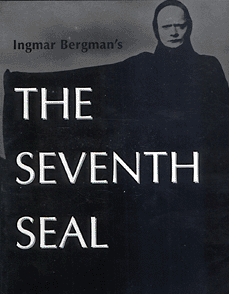 Panel 1: This is probably some
other form of Death, but he looks like Data, the android officer played by
Brent Spiner in Star Trek: The Next Generation to me.
Panel 1: This is probably some
other form of Death, but he looks like Data, the android officer played by
Brent Spiner in Star Trek: The Next Generation to me.
Panel 4: Under the scythe are very non-chess like board and card games,
including "Go Fish", "Uno", "Mouse Trap", "Yahtzee", "Sorry", and "Scrabble".
I suppose these are guide books on how to play these games, and if you need a
thick book to study "Go Fish"...
Panel 5: Lionel is writing "Kasparov by Fischer". Kasparov is alluding
to Garry Kasparov, the dominant chess player of our time. Fischer is Bobby
Fischer, a child prodigy in chess who disappeared as an adult, attributed with
myths and legends.
Panel 6: A popular folklore is the "wily peasant" tricking Death into
playing "chess games", with Death losing and unable to claim the mortal's
soul. These sort of stories is a tad rarer compared to the "Tricking the
Devil" stories, which play at a similar theme.
J. Kevin Carrier says: "The figure of Death here is
specifically taken from Ingmar Bergman's 1956 film
The
Seventh Seal, where a knight (played by Max Von Sydow) plays chess against
the Grim Reaper (Bengt Ekerot)."
Page 12
Panel 1: I don't know who the guy in the orange jumpsuit at the back
is, but his helicopter-like equipment looks like something coming out from
Alan Moore's Tom Strong series.
I can't read the Japanese Kanji characters under the ashtray.
I suppose Dennis is referring to Dennis Wheatley, the author of a good number
of horror novels regarding Satanism and Occults. Some of the descriptions in
those books are quite scary (during its time, at least), as noted by Lionel
here.
Panel 4: I think it's just a funny exclamation, but "Holy Eternally
Laughing Cow" probably has some weird reference I won't be able to catch
unless someone tells me so.
zachdms point out that this is a
reference to
Laughing Cow Cheese, which apparently has quite the
following.
Page 13
The Warrior Hero-Mage-Female-Elf-Dwarves combination is one of the most
typical grouping in High Fantasy novels and RPG campaigns post-LoTR. The
female's role is probably quite obvious, and this is especially emphasized in
Conan fiction. With hobbits being copyrighted by the Tolkien estate, D&D use "halfling"
as the name of a very hobbit-like race (albeit more comfortable to fighting),
though most people would prefer to cancel out the hobbit/halfling/halfwit race
and just use dwarves instead.
It is also a very common argument that the plural of "dwarf" is spelled as
"dwarfs", and Tolkien made the mistake of using "dwarves". Currently both
spellings are considered correct.
Page 14
Panel 1: I don't think I know any of the characters in line at the
background, other than the kid pulling out the Sword in the Stone (in vain).
Mike MacKenzie: "The man at the front of the line looks
strangely like Mr. Hyde in volume 2 issue 6 of Moore's The League of
Exraordinary Gentlemen."
Obelix, from the French Asterix-Obelix comics written by Goscinny and drawn by
Uderzo, is carrying a menhir on his back, standing beside Tarzan. Chewbacca
the Wookie from Star Wars can be seen behind Edgar Rice Burroughs' creation.
The boy and dog are respectively Jonny Quest and Bandit, from the Hanna-Barberra
animated series Jonny Quest. The older, teenage version here appears to be
from the 1996 Real Adventure of Jonny Quest, rather than the original 1964
preteen version.
Panel 2: I don't know who the man with the golden axe and the other in
black are. Sega once produced a game series entitled Golden Axe, but it is the
villain who has the axe, and he dresses up in armour.
Diello: "Couldn't the man with the axe be Conan, the more
Marvel-style at least? I believe he frequently carried a large axe."
Panel 4: The child from the Family Guy is holding a discoloured Maggie
from The Simpsons hostage. Pugsley Addams (from The Addams Family) is the boy
in the striped shirt, and the one seen here is straightly lifted from the
animated series (in that, most of the animated characters do not resemble any
of the original actors). The child on the left with the black eye is Barrel,
one of the three spooky children from Tim Burton's stop-motion film The
Nightmare Before Christmas. I don't know who the others are.
Diello: "The baby from Family Guy is named Stewie and is
hell-bent on world domination. The top of head in the middle at the bottom of
the panel looks like the hover-chair bound freaky-kid from Akira." The child
is Masaru, who not only has a special hoverchair (which precedes Professor
Xavier's, incidentally), but is also blue-skinned and possibly 60-70 years
old. Akira is a Japanese comic done by Katsuhiro Otomo, which was adapated
into an anime film, which perhaps was the first ever Anime movie ever released
in the West in a grand scale (The second being Princess Mononoke, and later
Spirited Away). It's an apocalypse futuristic fiction where several children
are trained, possibly for military purposes, to be psychics who can have
world-destroying powers. The movie was re-released in selected theatres in
2001, with better quality and more accurate dubbing. (Note: The movie and the
manga, apparently, are very different story-wise, but the Tetsuo-Kanaeda-Akira
tangent is still present) More on the re-released movie here:
http://www.akira2001.com/
The poster image is from Mike Minogla's Hellboy comics - the logo is the
paranormal investigation department Hellboy is assigned to, BPRD, which stands
for Bureau of Paranormal Research and Defense.
Panel 5: The little devil is Harvey Comics' Hot Stuff, the mischievous
little devil. I don't know who the girl he's dating is.
Eroom Nala says "Someone (I forget who) wrote that Hot Stuff is trying to date
Linda Blair from the Exorcist." The Exorcist is a horror fiction written by
William Peter Blatty, though it is more well known as the 1973 movie of the
same name. One of its most famous scene is when the character of Linda Blair -
a child star at the time - gets possessed by a demon, effectively distorting
her facial features, causing her to scream obscenities and spit some liquid
resembling green pea soup.
Page 15
Panel 1: I can't see clearly who is the person menacing Jack the
beggar. It might be Vhailor from Black Isle Studio's computer RPG Planescape:
Torment, a walking armour with an extremist and ultimate sense of justice, and
tends to deliver it before asking questions.
Diello points out, with better speculation: "Ah, I get the
gag now. The thing menacing Jack the Beggar is one of the cockroaches from
Dark Crystal again. That blue thing on its head that I couldn't identify
before is a police officers hat. They're working for the man here, too. Note
the billy club in its hand. Cleaning up the streets from riff-raff."
The person floating in the background may be the Michelin Man, or "Airbag"
from the Top Ten series, who inflates like a balloon when tense.
Panel 2: Who is that vampire with the little wings, and what is he
doing in broad daylight?
Diello: "The "vampire" has an 'n' on its chest. Nosferatu?"
Also, just noticed that the little wings on the back of the vampire looks like
what would appear among the demons in Mark Minogla's Hellboy comics. Is this
one of them?
Page 16
Panel 1: Diello says: "Note the Tootsie Pop on the right, just above
some McDonaldland cookies (note the trademark arches)."
Mike MacKenzie says: "The tootsie roll pop in the front yard prominently
displays the native American shooting the star. Legend goes that if the entire
figure appeared on your wrapper (without being cropped), then it would grant
your wish."
Page 18
Panel 5: There's obviously some reference as to the lightning bolt
scar on the horse's back. If only I know what it was?
J. Kevin Carrier points out: "The horse with the
lightning-mark might be a reference to two of Supergirl's "Super-Pets" from
the comics of the 1960s: Streaky the Super-Cat (who had a lightning-shaped
streak on his side) and Comet the Super-Horse (who had a comet-shaped
birthmark)."
Page 19
"These horses all have different brands." Well, I just don't know what the
references are. Aldric's horse has one that looks like a Ying Yang symbol,
Dwarf 1 the Bat Signal, Dwarf 2 the alphabet K in a circle, and Robyn a
section sign §.
Page 20
Panel 4: Glinda the Good is the Good Witch from L. Frank Baum's The Wizard
of Oz. The Undine is from Teutonic folklore - they are female soulless
water-spirits who like to associate with humans, who obtain their souls only
when they marry a human and bear his child. I don't know what a Slyph is other
than it possibly being a mythical creature.
According to J. Kevin Carrier, ""Slyph" should probably be
"sylph", which is an air elemental in folklore (and Dungeons & Dragons" Opps,
I did a spelling mistake there...
Page 23
Panel 2: Smax's facial hair is starting to grow back.
Panel 3: I'm not sure why there is a stick man in this picture. The
closest reference I can think of is the "Stick Man" joke in the webcomic
Sluggy Freelance, where Pete Abrams draws a stick man into an obscure area of
the comic on a random date and sees how many readers would spot it.
Page 24
As if the setting of the page isn't already humiliating enough to attack
Smax's quota of intelligence, his distinguished numbering of the senses makes
it look even worse.
Anonymous points out in response to the numbering of
senses: "It's not too uncommon to completely lack either a sense of smell or a
sense of taste. Some languages also use the same word for smell and taste.
Fifth sense may be perfectly accurate.
Also for someone who's supposed to be dumb as an ox Jeff has made a pretty
good transition to a world with totally different rules, totally different
culture etc..." Which, incidentally, is true.
J. Kevin Carrier says: "Smax being in the middle of a giant footprint and not
realizing it may have been inspired by Harvey Kurtzman's cover to
MAD #6".
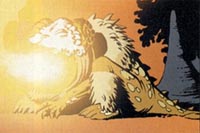 Chris Murphy points out:
"The questers camped out in a giant, three-toed footprint." This is
significant. In Smax #2, although we know that Morningbright may have
size-changing powers (probably not - Morningbright may just be able to
navigate through narrow tunnels much better than Smax believes), allowing him
to be large enough to create these footprints, note that Morningbright has
more than three toes. His forelegs end with hands (opposable thumbs), and his
hind feet have possibly four toes. This either points out that they have to
face another dragon, or basically just a visual gag.
Chris Murphy points out:
"The questers camped out in a giant, three-toed footprint." This is
significant. In Smax #2, although we know that Morningbright may have
size-changing powers (probably not - Morningbright may just be able to
navigate through narrow tunnels much better than Smax believes), allowing him
to be large enough to create these footprints, note that Morningbright has
more than three toes. His forelegs end with hands (opposable thumbs), and his
hind feet have possibly four toes. This either points out that they have to
face another dragon, or basically just a visual gag.
Note the similarly distinguished numbering pattern used in the "Coming Next"
tagline.
Thanks to: "Eroom Nala" and "zachd" of the DC forums,
Anonymous, KJW, J. Kevin Carrier, Diello, Chris Murphy, Mike MacKenzie, and
KOBE27.